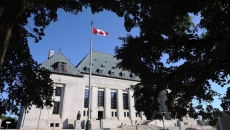In a split decision, the Supreme Court of Canada has upheld a federal law that forbids companies from making people undergo genetic testing before buying insurance or other services.
The Genetic Non-Discrimination Act also outlaws the practice of requiring the disclosure of existing genetic test results as a condition for obtaining such services or entering into a contract.
The act is intended to ensure Canadians can take genetic tests to help identify health risks without fear the results will pose a disadvantage when seeking life or health insurance.
In a 5-4 decision, the Supreme Court said Friday the measures are a valid exercise of Parliament's power over criminal law set out in the Constitution.
The law, passed three years ago, is the result of a bill introduced in the Senate that garnered strong support from MPs despite opposition from then-justice minister Jody Wilson-Raybould.
Penalties for violating the provisions include a fine of up to $1 million and five years in prison.
The Quebec government referred the law to the provincial Court of Appeal, which ruled in 2018 that it strayed beyond the federal government's constitutional jurisdiction over criminal law.
The Canadian Coalition for Genetic Fairness then challenged the ruling in the Supreme Court, which heard the appeal last October.
Five of the nine high court judges allowed the appeal, though they offered two sets of reasons as to how the provisions in question fall within the federal constitutional domain.
Four dissenting judges said the appeal should be dismissed because the measures come under provincial jurisdiction over property and civil rights.
The coalition successfully argued during the proceedings that the legislation was a permissible exercise of federal criminal law power.
It noted in a submission that the Supreme Court had previously emphasized this power must be interpreted in a broad, flexible and dynamic manner to allow Parliament to respond to new threats to fundamental personal interests such as health and security.
The federal attorney general contended the law dealt with the regulation of contracts and the provision of goods and services with the aim of promoting health, relating "fundamentally to provincial jurisdiction over property and civil rights."






